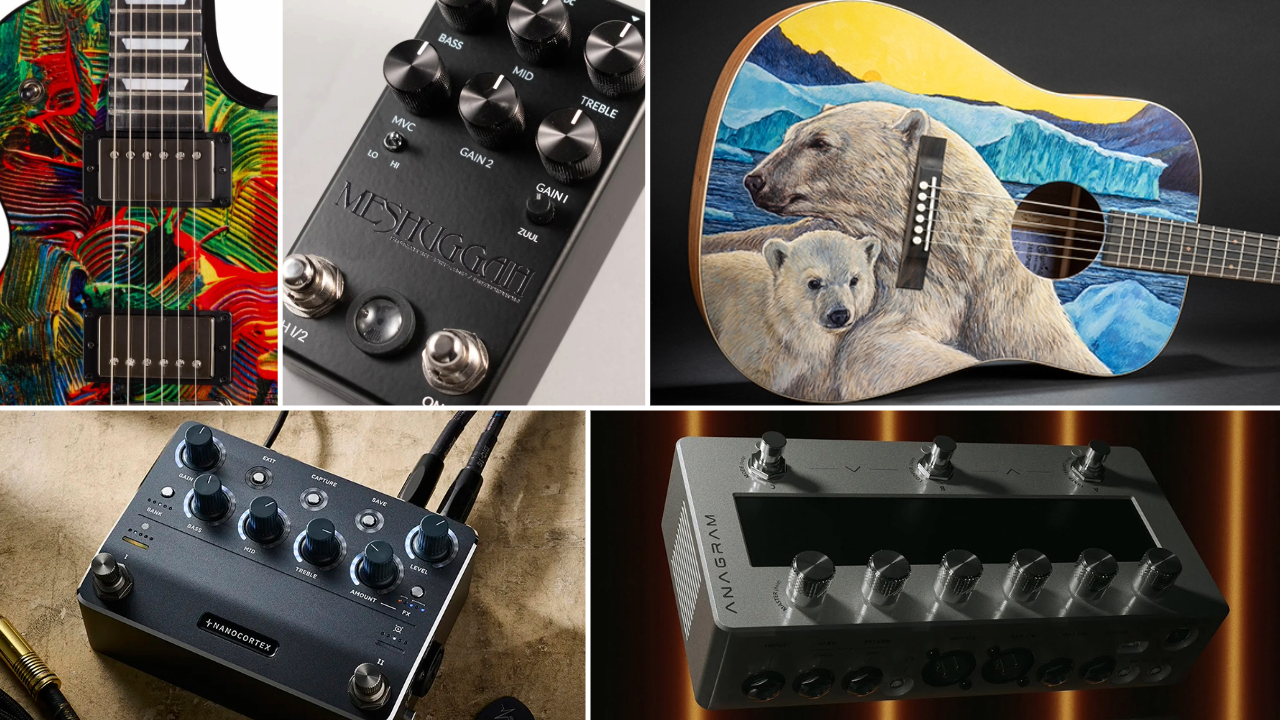The Offspring’s Dexter Holland and Noodles: “Everything from Smash ’til now seems like it’s all part of the same era”
Almost a whole damn decade in the making, The Offspring are officially back in top form with their timely new album, Let The Bad Times Roll

In the nine years since they dropped the icy and introspective Days Go By, The Offspring haven’t been entirely quiet – they’ve been a festival mainstay everywhere from Austria to Australia, and the latter years of the 2010s were their most prolific on the touring circuit since the ‘90s – but on the recorded front, fans have been malnourished for much too long. But just when the world needed lively, pit-splitting skate-punk scorchers more desperately than ever, the millennial playlist mainstays pulled through.
Let The Bad Times Roll is a turbulent as it is timely, with tracks that are polarising and political in theme, but unequivocally ripping in sound. ‘90s kids will glean the most out of its mid-fi production and raucous, rough-around-the-edges shredding à la colossal melodies – but then again, that’s par for the course for an Offspring record; it sounds nostalgic, but feels almost uncomfortably on-the-nose for 2021. It invites the listener to confront their modern-day anxieties head-on, but does so in an unusually fun way. Again, classic Offspring.
From their studio headquarters in LA, frontman Bryan “Dexter” Holland and guitarist Kevin “Noodles” Wasserman called to fill Australian Guitar in on what they aimed to accomplish with Let The Bad Times Roll, how their legions of new fans keep the vibes rolling high and mighty, and why it’s the beat-up beauties in their guitarsenal that made the record sound so goddamn explosive.
Is there a specific type of vibe or aesthetic that you’re interested in capturing on a track nowadays?
Dexter: I feel like we’re observers – whether it’s the news, or the way someone walks down the street, something just kind of catches you. And that’s just what I like to write about. There’s not any kind of grand plan. There’ll be snippets of different ideas, and then eventually you figure out how that puzzle fits together, how those snippets all connect and form somewhat of a song. And in this case, with Let The Bad Times Roll… Well, there’s a lot of bad times to write about! Inspiration was not exactly in short supply [laughs]. We wrote songs about things like opioid addiction and social unrest – of course things that are happening in our own neighbourhoods, but also things that I could tell were happening around the world – and this was what came out.
The Offspring has become such a cultural institution – the kids who were bratty, snot‑nosed punks when Smash came out now have their own bratty, snot-nosed punks for kids. Does it influence you on a creative level at all, knowing this band’s fanbase now spans several generations?
Dexter: I don’t think we think much about that when we’re going into the studio to create. What we do notice, though, is that there are always a lot of very young kids in the front row every night – especially any time we do a festival. They’re 14, and they weren’t there five years ago when we last went through their towns. Which I think is great. Because y’know, you hear so much about these bands where their fans grow old with them, and then that’s it – then they’re just kind of done. So it’s great to have all these kids come out to our shows. It’s almost like there’s an age gradient, right? As you move from the front of the stage back to the bar, you see more and more grey hair.
I bring it up because the penultimate track on this record is a throwback to “Gone Away” from 1997. Do you think it’s important, as a band that’s been at the forefront of modern punk for so long, to celebrate your past and not just ignore it in favour of the new?
Noodles: I don’t really think of “Gone Away” as being that old of a song. Y’know, everything from Smash ’til now seems like it’s all part of the same era to me. But “Gone Away” was a song that we’d been playing on piano during our live set – we kind of strip it down, and that really purifies the emotional part of that song. It’s also a very dynamic part of the set every night – it really does touch fans. They’ve spent years asking us to do a studio recording of that piano version, and we finally decided, “Yeah, that is actually a great idea!”
When you’re writing a song, do you think a lot about how it will translate to the stage?
Dexter: I think you imagine it in many different contexts – how will this look in a video? How will this feel live? I think when we come up with something that feels very punk – a song like “This Is Not Utopia”, for example – I get really excited thinking, “Oh, the kids are going to go off over this!” So I do apply it to a live context, especially if it’s a punk kind of song.
Get The Pick Newsletter
All the latest guitar news, interviews, lessons, reviews, deals and more, direct to your inbox!
Noodles: But that’s not to say that if you don’t think about it in a live context, it matters too much. When we’re in the studio, we’re looking for the ideas that make us go, “Oh, that sounds so good!” Then we worry about going, “Okay, how are we going to play this live?” But it does feel even better when you’re in the studio and you go, “Oh, kids are going to love this when we play it.” Like, “Hassan Chop” – that’s a freaking breakneck-speed punk song, it’s going to be so fun to play live! I think the hardcore Offspring fans from way back are going to love that one.
What guitars were you jamming in-studio?
Dexter: The main guitar was a ’65 SG Junior with the single P-90 in it, and it just sounds so great. That’s been the main guitar for the last few records – at least on [Let The Bad Times Roll] and Days Gone By. We probably started using it on Rise And Fall – but we have a bunch of different guitars here. We’ll have Les Pauls and Strats and Teles, and we also have a Malcolm Young signature Gretsch. I’ve started collecting guitars, so I have some of my old guitars stashed in here. One of the things that Bob [Rock, producer] taught us, which is so great, is that of course the vintage guitars sound the best – they just do…
Noodles: Why is that, though!?
Dexter: I think it’s the wood? They could use all those crazy types of wood that you can’t use anymore.
Noodles: It’s not that the wood is aged or matured?
Dexter: Maybe that’s part of it too, but there are woods that are banned now, it’s legal to make a guitar out of them.
Noodles: I was a guitar store and I saw this relic Strat, and I went, “Why would they do that to a Strat?” Why don’t they just make it sound like an old Strat, but have it look new? Not break up the finish and make it look all worn out. But then I actually picked it up and ended up going home with it that day [laughs]. There’s something about ageing it and beating it up a little bit that makes it unique, I think. It’s not as good as my real ’65 Strat that’s out in the recording room, but it’s pretty good.
Dexter: Well, what Bob taught us is that you don’t get the pristine ’56 or whatever – you get the beat-up one. Because it sounds just as good, and it’ll cost a tenth of the price. And the beat-up ones are kind of cooler, anyway.

Ellie Robinson is an Australian writer, editor and dog enthusiast with a keen ear for pop-rock and a keen tongue for actual Pop Rocks. Her bylines include music rag staples like NME, BLUNT, Mixdown and, of course, Australian Guitar (where she also serves as Editor-at-Large), but also less expected fare like TV Soap and Snowboarding Australia. Her go-to guitar is a Fender Player Tele, which, controversially, she only picked up after she'd joined the team at Australian Guitar. Before then, Ellie was a keyboardist – thankfully, the AG crew helped her see the light…
“I loved working with David Gilmour… but that was an uneasy collaboration”: Pete Townshend admits he’s not a natural collaborator – even with bandmates and fellow guitar heroes
“You’ve gotta lose the fuss. You grab the new guitar, you scratch it. Grab the key right away": Kiko Loureiro on why players shouldn’t be too precious about their guitars







![[from left] George Harrison with his Gretsch Country Gentleman, Norman Harris of Norman's Rare Guitars holds a gold-top Les Paul, John Fogerty with his legendary 1969 Rickenbacker](https://cdn.mos.cms.futurecdn.net/TuH3nuhn9etqjdn5sy4ntW.jpg)


